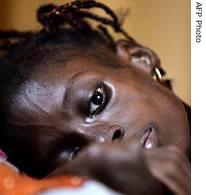-
(单词翻译:双击或拖选)
Washington
30 May 2007
The World Health Organization and UNAIDS, the United Nations Program on HIV/AIDS, Wednesday issued new guidance on HIV testing, saying millions of people are infected with the deadly virus but are unaware1 they have it. As VOA's Jessica Berman reports, the international bodies say health providers should offer to test people instead of waiting for patients to request HIV tests.
 |
| A young HIV-infected woman lying in an Abidjan hospital |
An estimated 40 million people throughout the world are living with HIV. More than 60 percent live in Africa.
Kevin De Cock, the director of the HIV/AIDS program at the World Health Organization, says the guidelines are essential if people are to be treated. "We think these new guidelines are extremely important as we struggle to move towards universal access to prevention, treatment, care and support which the countries of the world have committed to," he said.
Instead of waiting for patients at walk-in clinics and hospitals to request HIV tests, Paul De Lay of UNAIDS, says the guidelines urge health care workers to offer HIV tests as a routine part of medical care. "It encourages health care providers to recommend an HIV test to people who show symptoms of illness, or who likely benefit in health terms from an HIV test," he said.
But the officials say under no circumstances should people be coerced2 into taking a test, nor should one be administered without their consent. The officials say those who test positive must also receive counseling afterward3.
In addition to getting AIDS treatment they might ordinarily not receive, De Cock says people who know their HIV status are less likely to spread the infection to others. "There are data from the United States certainly showing safer behavior once people know their HIV infection status. Because the overwhelming majority of HIV-infected people wish to do everything they can to prevent transmission to others," he said.
Experts say it is unclear how the recommendations for HIV testing will be received in cash-strapped nations, particularly in Africa. According to one expert, the health care systems in many countries are in disarray4, and many people who are HIV-positive fail to seek care until they are very sick.
 收听单词发音
收听单词发音
1
unaware

|
|
| a.不知道的,未意识到的 | |
参考例句: |
|
|
|
2
coerced

|
|
| v.迫使做( coerce的过去式和过去分词 );强迫;(以武力、惩罚、威胁等手段)控制;支配 | |
参考例句: |
|
|
|
3
afterward

|
|
| adv.后来;以后 | |
参考例句: |
|
|
|
4
disarray

|
|
| n.混乱,紊乱,凌乱 | |
参考例句: |
|
|
|















